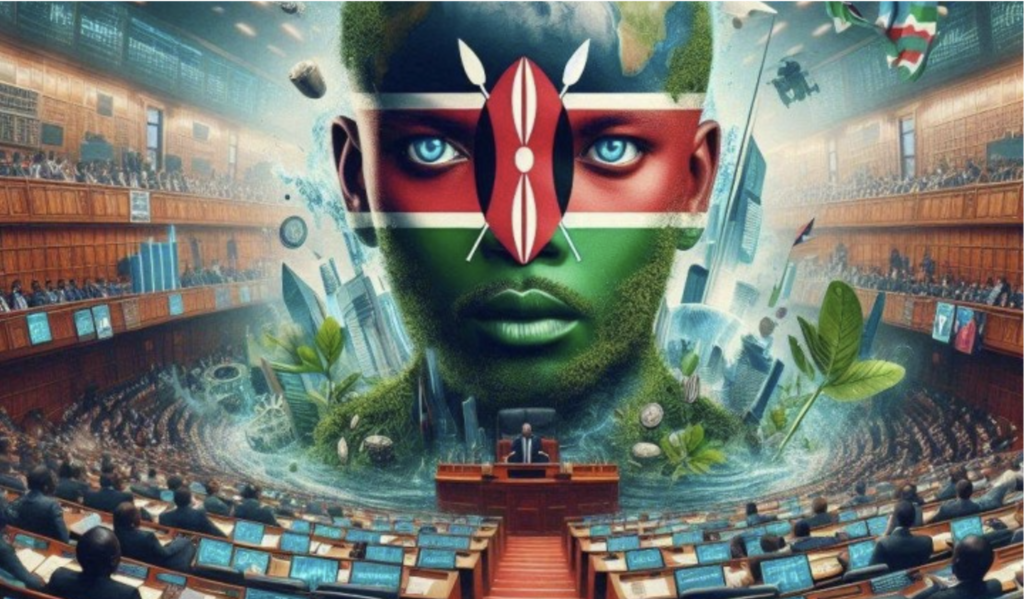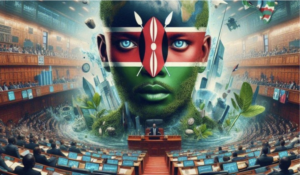Author: Antonio Makanga
Nairobi, my once-green city in the sun (well, now just a city in the sun), continues to struggle with the aquatic consequences of floods, a not-so-sunny side effect of climate change. Meanwhile, the Kenyan Parliament is hosting public participation sessions on the contentious Finance Bill 2024.
As an environmentally woke youth, I’m choosing to see the silver lining in this bill’s potential positive impact on the environment. Because, you know, we’ve got to find that silver lining to keep our spirits from getting all soggy like our streets.
Ecolevy
An eco levy is an environmental tax aimed at promoting sustainable practices and reducing environmental impact. The Finance Bill 2024 introduces an eco levy on goods manufactured in or imported into Kenya that have a significant ecological footprint. This includes items such as plastic packaging, rubber tires, cement clinker, and various technology products like smartphones and computers. E-waste, particularly from electronics, has become a significant environmental concern in Kenya.
The primary goal of the eco levy is to support environmental initiatives like conservation projects, renewable energy developments, and waste management programs. By making environmentally harmful products and activities more expensive, eco levies aim to shift consumer and business behavior towards more sustainable choices. If implemented, Kenya will become the second country in Africa after South Africa to introduce such a tax, setting a precedent for environmental responsibility.
Increased Excise Duty on Plastic Products
The bill proposes higher excise duties on plastic products, significant contributors to environmental pollution. One key proposal is an excise duty on all plastic products under specific tariff headings, whether locally produced or imported. This includes items like plastic packaging, which will increase excise duty by 10%.
This measure is expected to significantly increase the price of plastics, thereby reducing their usage. Plastic waste has been a significant contributor to recent flooding in Nairobi, as improperly disposed plastics block drainage systems. This duty aims to mitigate such issues by discouraging the use of plastic products.
Environmental Impact Fees
The bill suggests implementing fees on manufacturers and importers of certain goods to ensure they contribute to mitigating the environmental damage caused by their products. This aligns with the polluter-pays principle, holding companies financially responsible for the ecological costs of their operations.
Additionally, the bill reintroduces Environmental Impact Assessment (EIA) fees previously waived to facilitate ease of doing business. These fees ensure that manufacturers and importers contribute to mitigating the environmental damage caused by their activities.
In conclusion, the funds collected from these taxes are intended to support sustainable waste management programs and the development of waste management infrastructure across Kenya. This is a commendable initiative from the government. However, there are concerns about whether these funds will be effectively used for environmental mitigation or fall prey to corruption and misallocation.
For us as youths, it’s crucial that these funds are transparently and strictly used to support environmental mitigation efforts. Just like taxes from betting have supported sports and talent ministries, implementing these eco levies and environmental impact fees could have a significant positive impact on our country’s climate mitigation efforts.
It’s not just about the environment; it’s about ensuring a better future for all of us. If managed with integrity and transparency, these measures could pave the way for cleaner, healthier communities and a sustainable future for Kenya, keeping our country as a front-runner in the world of climate mitigation.







